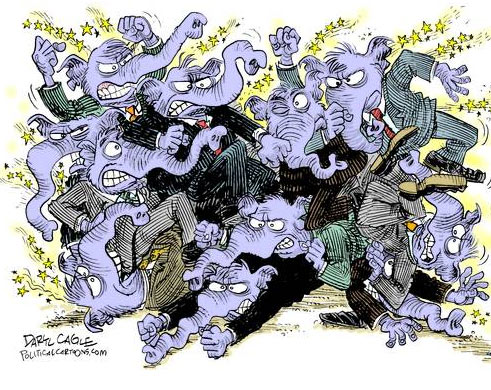
Take the quadrennial excitement of the Olympics, the winner-take-all jolt of the Super Bowl, add a few Roman gladiators and maybe a flyby of Halley's Comet.
Put them all in Cleveland's Quicken Loans Arena with the insurgent Donald Trump and a desperate Republican establishment, and you have an election junkie's paradise: A presidential nominating gathering that may - just may - resemble the political free-for-all of an old-school contested convention.
"I've been waiting for this my whole life," said Mark Plotkin, a political commentator for the Hill and the BBC who could slip a reference to Teno Roncalio into a conversation about the weather. (What, you didn't know that Roncalio was the Wyoming delegate who put John F. Kennedy over the top in 1960?) Like many a convention aficionado, Plotkin has been spoiling for a floor fight for decades.
"I've been to 16 conventions that were political infomercials," he said. "I want chaos." These are heady days for the wonks and nerds who follow politics like a fantasy sport. Already they've been riveted by a primary season that could have been scripted by Jerry Springer. And now there is at least the possibility of the first genuine contested convention drama in a generation.
Stephen Hess, a presidential scholar at the Brookings Institution, got a taste of chaos as a floor volunteer at the wide-open 1952 GOP brawl in Chicago, and he liked it. Nothing he has seen since compares with the fistfights, vote-switching and stratagems that spit out Dwight D. Eisenhower and Richard M. Nixon as the nominees.
"There is a real joy going on day one having no idea who is going to be the nominee on day three," Hess said. Modern conventions "have just become incredibly dull."
For historians, the prospect of a gavel-to-gavel, high-definition view of a real delegate dust-up is the stuff of daydreams.
"It's one thing to read in old newspapers about police having to cordon off the convention," the historian Doris Kearns Goodwin said, thinking of the 1912 blowout between GOP candidates Theodore Roosevelt and William Howard Taft. "The idea of watching one in real time would be a thrill."
Every election cycle includes its period of wishful convention thinking. Maybe this will be the summer with something more exciting than a lackluster spat over a platform plank. And then the modern prime-time plenary ensues - a tightly controlled, no-surprises pageant where all the drama is in the balloon drop.
"There is just nothing of substance and nothing of political interest," said Norm Ornstein of the American Enterprise Institute, who has been to every convention since 1984.
Could this be the year?
The crowded field makes it possible that Trump may not finish with the 1,237 delegates he needs to win on the first ballot. And many in the GOP's #nevertrump movement have pinned their hopes on a last stand in Cleveland. Mitt Romney, the 2012 nominee, called for just such a showdown.
"I still don't think it will happen, but it is certainly more likely than any time since 1976," said Al Hunt, a columnist for Bloomberg View and a veteran of 21 conventions.
Ah, 1976. That's as close as most living government geeks have gotten to a true nomination donnybrook. It may not have been the 1924 Democratic marathon that took more than two weeks and 103 ballots to crown compromise candidate John W. Davis. Still, there was no certainty in 1976 that either Ronald Reagan or Gerald Ford could secure a first-ballot win. The intrigues were a wonk's delight.
"The tension was unbelievable," said Hunt, who was on the floor when the Mississippi delegation flipped for Ford. "But just imagine if something like that happened this summer. It would be a zoo."
It's hard to imagine what a contested convention would look like in the current age, these experts say. For one thing, it wouldn't be a "brokered" convention because there are no brokers. Power is too diffuse in the weakened modern parties.
"There won't be any smoke-filled rooms," Hess said. "There's air conditioning, and everything is non-smoking. Mitch McConnell and Paul Ryan couldn't orchestrate anything. This isn't Henry Cabot Lodge in 1920" - one of the Svengalis of the convention that nominated Warren G. Harding.
But social media and the white-hot antipathies among Republicans could produce not just sparks but a burning barn. And for all of their giddiness over the prospect of a real contest, many of the convention dreamers are also filled with dread.
The potential crackup of the Republican Party could damage the entire political system, Hess said. What would be great fun for the pundits would be bad for democracy, Hunt said.
"Yes, my juices are flowing at the possibility," Ornstein said. "But they are acidic juices, and they're making me sick to my stomach."
Ornstein said his convention musings turned sober this month when Cleveland asked for federal aid to buy 2,000 sets of riot gear in advance of the July gathering. Could 2016 go the way of 1968, the baton-swinging Democratic fracas in Chicago, or the 1964 GOP melee in San Francisco?
"You had people beaten up, you had journalists pushed around," Ornstein said. "Sound familiar? It could happen again."
For his part, Plotkin is not pining for violence. But a few days of rudeness would be just fine. He watched his first convention at age 9 with his grandmother - the great 1956 vice presidential brouhaha between John Kennedy, Estes Kefauver and Al Gore Sr. He has little patience for the sterile, dissent-smothering rules of today.
"This is not a meeting of Rotarians," Plotkin said. "We can stand it. This is what democracy is supposed to be about."
Comment by clicking here.



 Contact The Editor
Contact The Editor
 Articles By This Author
Articles By This Author